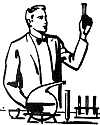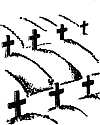 And it is a very fortunate thing for us today that the previous
sanitation experience of Doctor Donald Ross and Doctor Walter Reed in
Cuba gave Doctor Gorgas the background to win his uphill fight with
many officials who didn't see this real problem but only the apparent
problem of moving dirt and building locks. For three years, Gorgas
conducted an intensive campaign to exterminate the carriers of fever -
erecting mosquito-proof buildings, installing an efficient sewerage
system and putting oil on stagnant pools.
And it is a very fortunate thing for us today that the previous
sanitation experience of Doctor Donald Ross and Doctor Walter Reed in
Cuba gave Doctor Gorgas the background to win his uphill fight with
many officials who didn't see this real problem but only the apparent
problem of moving dirt and building locks. For three years, Gorgas
conducted an intensive campaign to exterminate the carriers of fever -
erecting mosquito-proof buildings, installing an efficient sewerage
system and putting oil on stagnant pools. When we finished the Canal, in 1914, the death rate in the United
States was 14 people per thousand. In the Canal Zone, it was only 6
people per thousand when the French were trying to do the job, they
were losing about 200 out of every thousand men. Through the effort of
Gorgas and his men, the Canal Zone was made over twice as healthy to
live in as the United States.
When we finished the Canal, in 1914, the death rate in the United
States was 14 people per thousand. In the Canal Zone, it was only 6
people per thousand when the French were trying to do the job, they
were losing about 200 out of every thousand men. Through the effort of
Gorgas and his men, the Canal Zone was made over twice as healthy to
live in as the United States.As we look back on the construction of the Panama Canal, we must admire General Gorgas' ability to see it as a great problem in medicine as well as engineering construction. (General Gorgas was gifted, through his experience, with the ability to see beyond the apparent problem of moving huge amounts of earth with steam shovels and to pick out the real obstacles - mosquitoes. |








